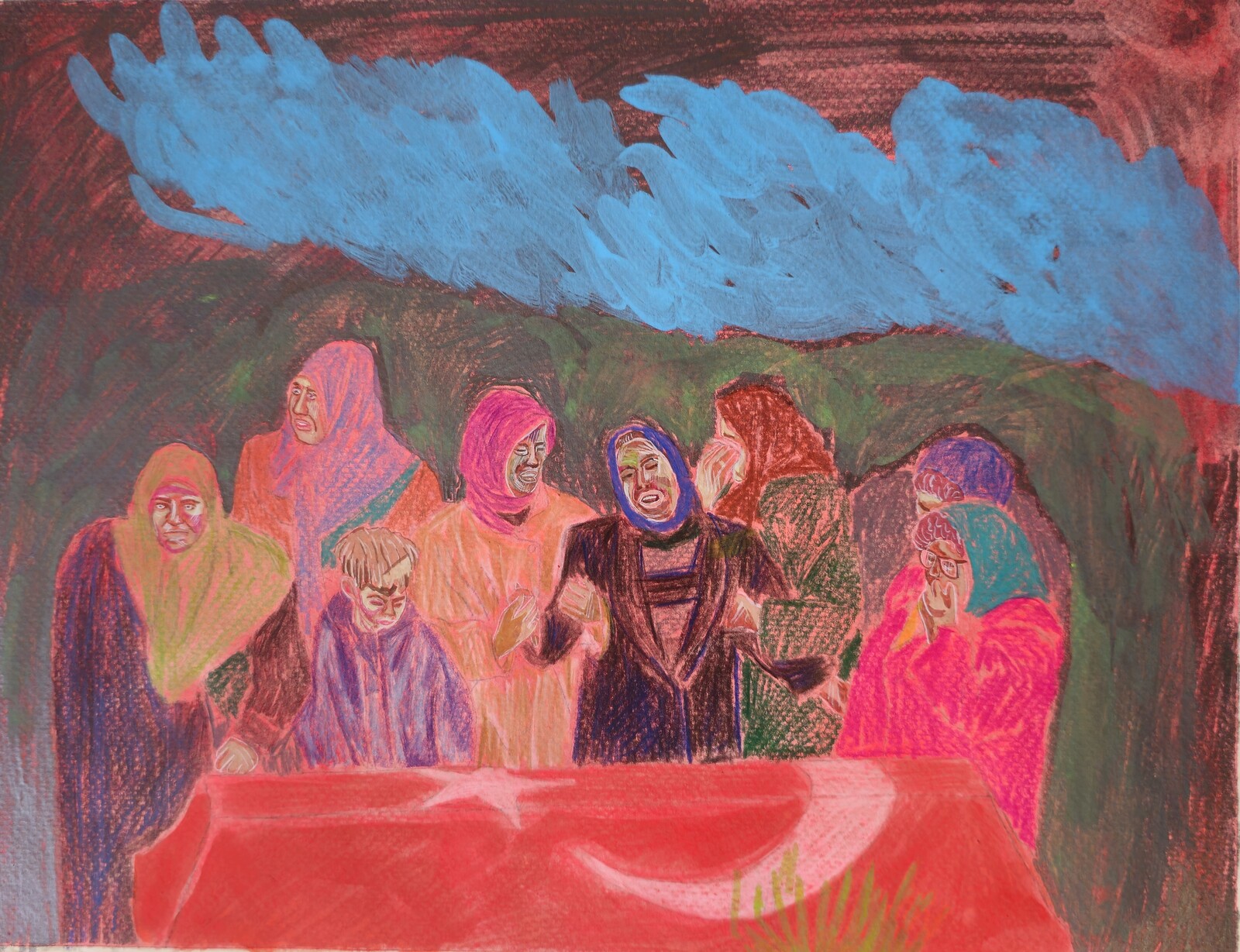Alt-Hermsdorf 35
13467 Berlin
Germany
In an era marked by political polarization, decreasing tolerance, and societal shifts to the right, the Ruckhaberle Award highlights the importance of open spaces for artistic expression and critical discourse. The award honors visual artists living in Germany who, through their work, find compelling ways to illuminate complex or underrepresented social contexts and contribute to a nuanced understanding of our time.
This year’s nominees—Emma Adler, Arijit Bhattacharyya, Rob Crosse, Anna Ehrenstein, Iden Sungyoung Kim, Ronak Moshtaghi, and Beatrice Moumdjian—offer diverse perspectives on pressing topics: they explore the mechanisms of political propaganda, the spread of conspiracy myths, and the persistent threat of far-right violence in Germany. They also shed light on the complex experiences of queer Muslim identities and recount diasporic family stories that, through their interweaving of different places and times, raise universal questions of belonging and identity. A central focus is the processing of historical traumas, including the devastating consequences of nuclear war, forced labor, and colonialism. The artists reveal how deeply these events are inscribed in both collective and individual memories and how they continue to resonate today. Despite the weight of many of these topics, a hopeful dimension runs through the works: they articulate a vision of empathy, understanding, and mutual care and invite us to engage with the perspectives of others and seek shared paths toward a future rooted in solidarity. The shortlist exhibition at GalerieETAGE / Museum Reinickendorf has been curated by Sandra Teitge.
The 2024 Ruckhaberle Award Recipient: Arijit Bhattacharyya
The jury selected Arijit Bhattacharyya for his compelling project, The Night of Long Silence, a poignant essay on forms of remembering and forgetting, on museal objects and systems of classification—and on the recurring transnational, fascist desire for ethnic purity of bodies and ideas. In his small-format drawings, Arijit engages with landscapes of violence, scenes of brutality, far-right attacks, and grieving relatives of the victims. His vividly colored depictions evoke, in their immediate intensity, images reminiscent of trauma therapy. They address, among other issues, the racist riots of the post-reunification years and the NSU series of murders. Arijit examines objects of colonial looted art, such as those found in museums like the Humboldt Forum Berlin, within the context of these violent interconnections.
Furthermore, he expands his focus to the global dimensions of violence and ideology by exploring the complex history of transcultural relations between National Socialism and the still very influential Indian Hindu nationalism. His works do not shy away from exposing how Heinrich Himmler was fascinated by yoga and the reappropriation of the Bhagavad Gita, or how Madhav Sadashivrao Golwalkar, leader of the right-wing, Hindu-nationalist paramilitary organization RSS, aligned his ideology closely with National Socialism.
What particularly convinced the jury was the spatial realization of his project: Arijit extends his series of drawings with museal objects—stuffed animals, found artifacts, letters—as well as an evocative audio commentary that invites us as museum visitors to actively participate in the process of critical remembrance and to confront essential questions: “Do we remember what we must remember? Will Germany remember those it so desperately wishes to forget?”
Born in Bally, West Bengal, and now based in Weimar, Thuringia, Arijit Bhattacharyya’s interdisciplinary practice spans installation, textiles, drawing, painting, film, performance, and culinary arts. His work interrogates historical narratives, ecological entanglements, power structures, and anthropocentric paradigms. Through collective collaboration, he subverts hegemonic influences, creating spaces for critical reflection and dialogue. Arijit is an alumnus of Bauhaus Universität Weimar and Maharaja Sayaji Rao University of Baroda.
The Jury of the 2024 Ruckhaberle Award:
Kaya Behkalam, Artist and Director Künstlerhof Frohnau
Gürsoy Doğtaş, Curator and Writer
Rike Frank, Executive Director, Berlin Programme Artistic Research
Johanna M. Keller, Programme Officer, Akademie der Künste, Berlin
Dr. Sabine Ziegenrücker, Director, Department of Art and History Reinickendorf
Since 2019, Künstlerhof Frohnau Berlin (KHF) and the Department of Art and History Reinickendorf have presented the Ruckhaberle Award to honor the legacy of artist, curator, and cultural politician Dieter Ruckhaberle. The award includes a stipend, an artist residency at Künstlerhof Frohnau, and a publication. Past recipients include Nafis Fatollahzadeh, Uliana Bychenkova & Anna Scherbyna, Surya Gied, Annette Frick, and Luiza Prado.
The project is supported by the Berlin Senate for Culture, as well as the KoGa and FABiK Funds.











